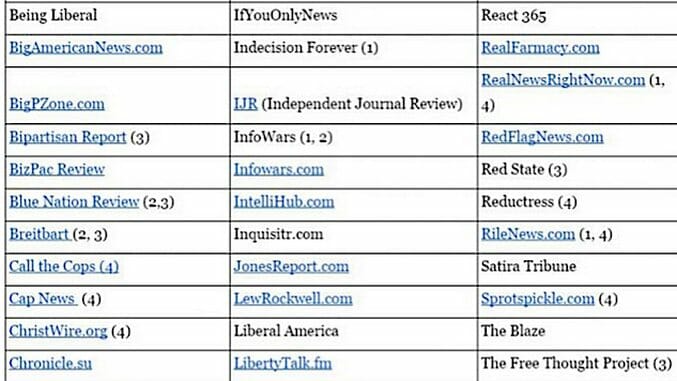An Interview with the Professor Spearheading the Fight Against Fake News Sites

Facebook and Google are taking steps to cut off the flow of money to websites profiting off of blatantly false content. Internally, Facebook is questioning whether or not fake news shared on its network contributed to Donald Trump’s victory. Google took heat on Monday after it was discovered that its news link for “final election results” was a fake news site.
Melissa Zimdars, an assistant professor of communications at Merrimack College in Massachusetts, is trying to do her part to help people navigate the flood of attention grabbing headlines.
Zimdars has created a public Google Doc called “False, Misleading, Clickbait-y, and/or Satirical ‘News’ Sources.” The document is a list of 139 websites that are “fake, false, or regularly misleading websites.” (Currently being updated.) Originally created as a guide for her students, Zimdars’ list has gone viral since she made it public.
The list is not just blatantly fake sites; it also includes sites that misrepresent otherwise true facts and sites that may use misleading headlines to promote otherwise good journalism. Also featured are satire sites like The Onion and The New Yorker’s Borowitz Report, because some people just don’t understand that they’re jokes.
Zimdars spoke with Paste about her list and the importance of being media literate while browsing social media.
Why did you decide to make the list?
The impetus for this specific list, which I created the Google Doc Monday morning, was to share with my class. Part of it’s connected to years of rolling my eyes at what I’ve seen circulated by my friends on Facebook, and concern over what my students cite as sources in class and in papers. I felt like, with this election in particular, some of what they were sharing with me was problematic, and a lot of what I was seeing my friends circulate was problematic. So I was like, okay, I want to make a guide to help them.
Other people have posted similar things online, which I didn’t really know about until after I started do this, but I wanted something at the time that was just a simple resource I could talk I could through with [my students] in class.
How do websites end up on the list?
It’s a combination of sites that I’ve witnessed being hyperbolic over a long time, so a lot of them are just from my own internet travel, some of them are recommendations from other communications and media colleagues, or Facebook friends reminded me of them. Like a friend of my sent me a short list, I link to it at the very bottom of the Google Doc, from a Patheos blog. Most of them I already had on the list. A couple of them I already had on the list, but a couple I didn’t know so I double checked them and added them. So it was really a collaborative process. Then I sort of vetted ones I was unfamiliar with, or did research on them.
So it wasn’t entirely from my mind, obviously nothing in the world is, but this masterlist is generally me pulling from multiple sources, my own observations and notes.
-

-

-

-

-

-

-

-

-

-

-

-

-

-

-

-

-

-

-

-

-

-

-

-

-

-

-

-

-

-

-

-

-

-

-

-

-

-

-

-








































